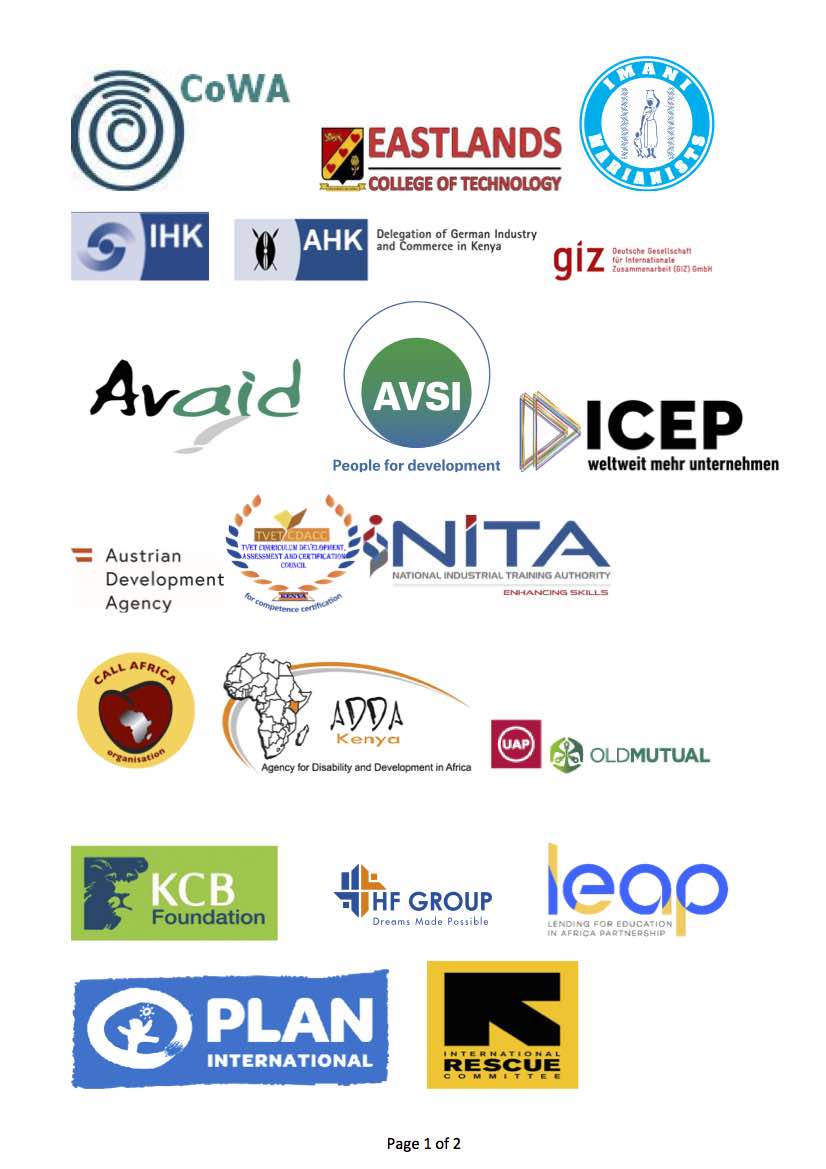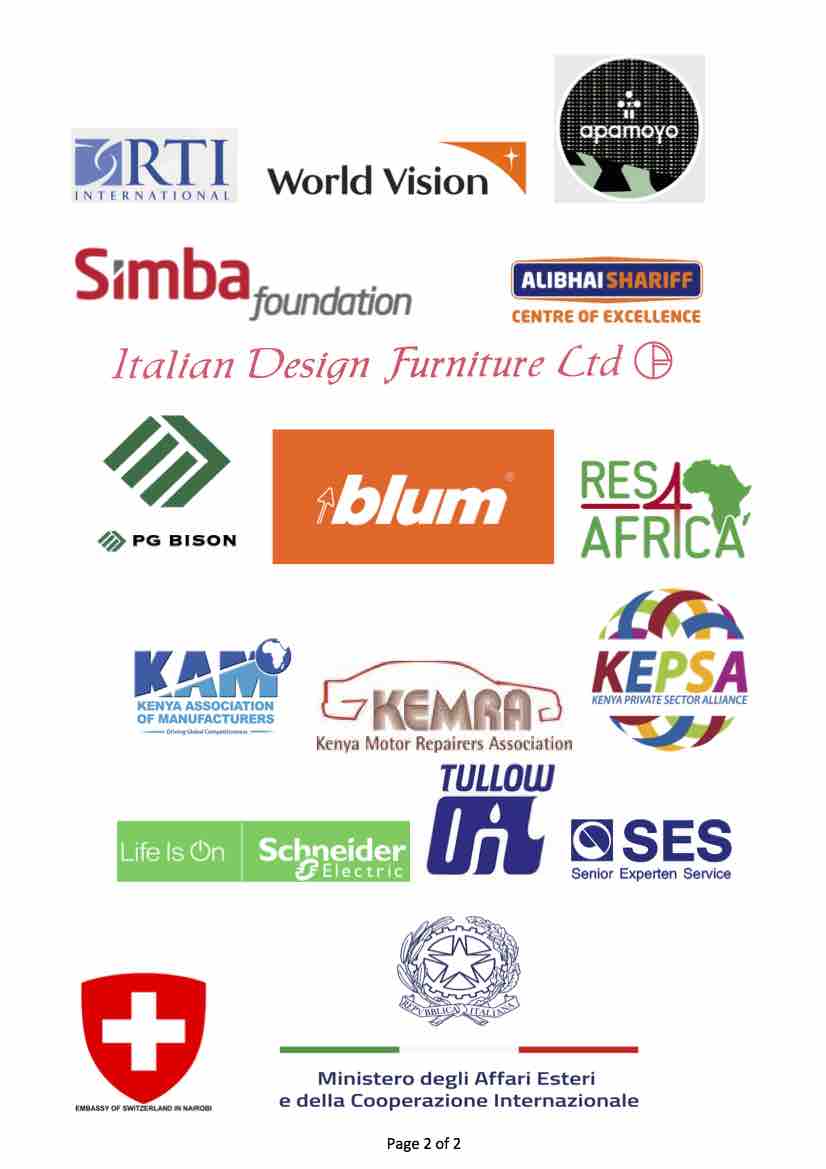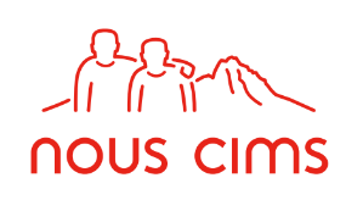St. Kizito is;
- a Vocational Training Institute of the CATHOLIC ARCHDIOCESE OF NAIROBI
- an Institute of Technology & Examination Centre Registered by the Government
Useful Information;
- Registration No. TVET/PRIVATEVTC/008/2019
- PIN No. P051097616A (ARCH-DIOCESE OF NAIROBI)
- PO Box 759 - 00618 RUARAKA - NAIROBI – KENYA
Our History
The late cardinal Maurice Michael Otunga, former Archbishop of Nairobi, in 1990 asked A.V.S.I. (an International NGO - www.avsi.org) to establish a technical school in the poor areas of the city. He told to AVSI management:
"Kenya, and particularly Nairobi, have an urgent need of educational opportunities in the technical field: so frightfully many are, in fact, the youth who are jobless and often on the brink of desperation and criminality... I am sure that not only the technical but also the human aspects of such an enterprise would be taken care of."
In fact, Nairobi is facing problems and contradiction caused by an unbalanced and vertiginous population growth. The problems of youth are very serious: thousands of them leaving school before they complete their studies and, while few, with a lot of difficulties, find a job, many are unemployed. The problem is even greater for the youth coming from the outskirts of the city, who, having completed their primary education, cannot continue any further and end up with no qualification at all. For them the possibility of employment and the chance of a dignified life becomes rather slim.
In the socio-economic context described above, the primary needs facing the youth living in Nairobi are:
· The opportunity of adequate professional training;
· The identification of job opportunities;
· To spread amongst the youth sentiments of self esteem and a spirit of solidarity at work.
Intervention
A.V.S.I. took up the challenge of CardinalOtunga and, supported by the Archdiocese of Nairobi and by the Italian Co-operation, started the project with some volunteers in 1991.
St. Kizito VTI was built in the North East outskirts of Nairobi (Githurai-Kimbo area).
The institute was completed in 1994 on a compound of about 20,000 sq. meters. It comprises of workshops, classrooms, and offices, covering a built area of about 8,000 sq. meters.
In 1994 the Institute was opened, enrolling 63 boys and offering Carpentry &Joinery, Motor Mechanics and Electricity courses. At the end of the year the students were examined by a team of the “Ministry of Research and Applied Technology” to obtain the "Grade III Certificate".
In 1996 two new courses were started: Dressmaking, Tailoring & Embroidery and Secretarial course. The institute became able to provide vocational opportunities to young women, who are much more disadvantaged in looking for appropriate education and employment
Development
In 1997, following the advice of the “Ministry of Technical Training”, the courses: a) Motor Vehicle Mechanics and Electrical, b) Electrical Installations, c) Carpentry & Joinery, d) Dressmaking, Tailoring & Embroidery, were upgraded and students are now prepared for the "Grade II Certificate", as provided by the government.
In 1997 a new branch was built in Roysambu area. This improved the accessibility of the courses especially for girls who have applied in a great number.The Roysambu branch, which is next to the main road from Nairobi to Thika, is meant to favour the participation of youth living in some very poor areas located not far from the premises of the Institute.
In July 1997 a new Computer course was started in Roysambu.
In 2000 two new courses were started: Plumbing & Metalwork and also Electronics Servicing Technology.
In January 2005, the school introduced the Artisan Certificate Level for the courses of Motor Vehicle Mechanics and Electrical Installation and Craft Certificate Level for Electronics Servicing Technology. This then was taken by the Management as an answer to the labor market in need of technicians with a preparation focused on practical and also theoretical knowledge.
Educative Aim
Education means to introduce the youth into the reality in all its factors; for this reason reality is the point of reference of the work in the school. In St. Kizito VTI through the relationship with the teacher, the young person becomes aware of his personal reality and he is introduced to the knowledge of the world around him. This relationship provokes and leads to the development of the inborn potentialities of the person in a way that is both rich and unique, according to the destiny of goodness for which God created him or her.
The vision of life that our school proposes is born of the catholic experience, which is at the origin of its foundation and its operations. From this experience it follows that everything that exists and happens in the personal and scholastic life is positive. This awareness is offered by the school staff to the students in the daily learning activities, through specific choices of contents and methods.
Improvements.
1. To increase the efforts to educate the students in all dimensions:
- To build a strong personality of the student (self awareness) so that he/she can face the challenges of the work environment. In fact some of them, even if they find good job opportunities, do not have the strength to sustain the stress of the work. This task is mainly for our trainers who should follow the student personally.
- Direct contact with the work environment: Mentorship from managers, Visit to companies.
- To give a better Technical training through: upgrading of existing courses; tailoring of syllabus to integrate the demands of the job market, new short courses.
- To increase the Entrepreneurial capability of students through: Lessons with the help of COWA and other external trainers, Mentorship from managers of companies, Witnesses of successful stories from former students.
- To experiment the “on job (dual) training”. HOW: Contact with companies and their umbrella Organizations. Involvement of competent Ministries of the Government to facilitate the introduction of this new method.
- To enlarge the school libraries for both branches of the school and equip them with relevant textbooks, accessible to both instructors and students.
- To improve the equipment of laboratories according to the needs of new or existing courses.
- To consolidate the “tracer” statistic for leavers so that St. Kizito can better plan actions to improve its results. HOW: To involve volunteers, Alumni Club and consultants for interviews.
- To promote Sport activities.
2. Continual training of managers and teachers.
The beneficiaries of St. Kizito are the students; their growth and learning can be obtained only from committed managers and teachers who share their sense of responsibility and knowledge.
- To favour a deeper self awareness so that they become more authoritative than authoritarian. HOW: Seminars with experienced educators (9).
- To give the staff the opportunity to improve their teaching. HOW: To have regular staff/departmental meetings to discuss pedagogical issues (18 meetings); Instructors qualification to be upgraded by enrolling for appropriate teacher training, since St. Kizito is upgrading the training levels (diploma, CRAFT).
- To impart better knowledge of new technologies. HOW: Training of trainers by expert lecturers from universities, companies, international consultants (21). The trainings will focus on innovative subjects that are needed by the market and can originate new courses and integrated syllabus in St. Kizito.
- Review and rotation of staff duties.
- To expose Students to various existing career opportunities in their specialties earlier enough as from day 1, to allow them make decision on the path they would want to pursue.
- Improve the procedure manual, clearly defining the role and appointment of the board.
- Restructure the industrial liason department (evaluation of actual human resources)
3. To be in line with the need of the labour market and keep up with the new technologies.
4. To increase the synergies with private and public sector and universities.
- To consolidate the management of the data base of the “Friend Institutions” (Companies, Educational, Religious).
- Training with private sector: Dual Training; Internship; T.O.T. (training of St. Kizito trainers by Companies); VTI & Company organize courses that are beneficial for the company; Courses for small entrepreneurs (jua kali, ...).
5. Sustainability of St. Kizito VTI.
- Improve the Marketing Strategy: To better communicate the potential of St. Kizito VTI in order to attract more students; Sell some of its services such as vehicle service, catering, ….
- To reduce the negative perception from the community that VTIs are for failures: To organize Open Days, meetings with Parents.
- To increase the Income generating activities.
6. Improve the Networking with the best national and international VTIs.
- To strengthen and expand the existing network among partner VTIs in Nairobi.
- To involve other international VTIs in the net.
The graph below shows the trend from 2015

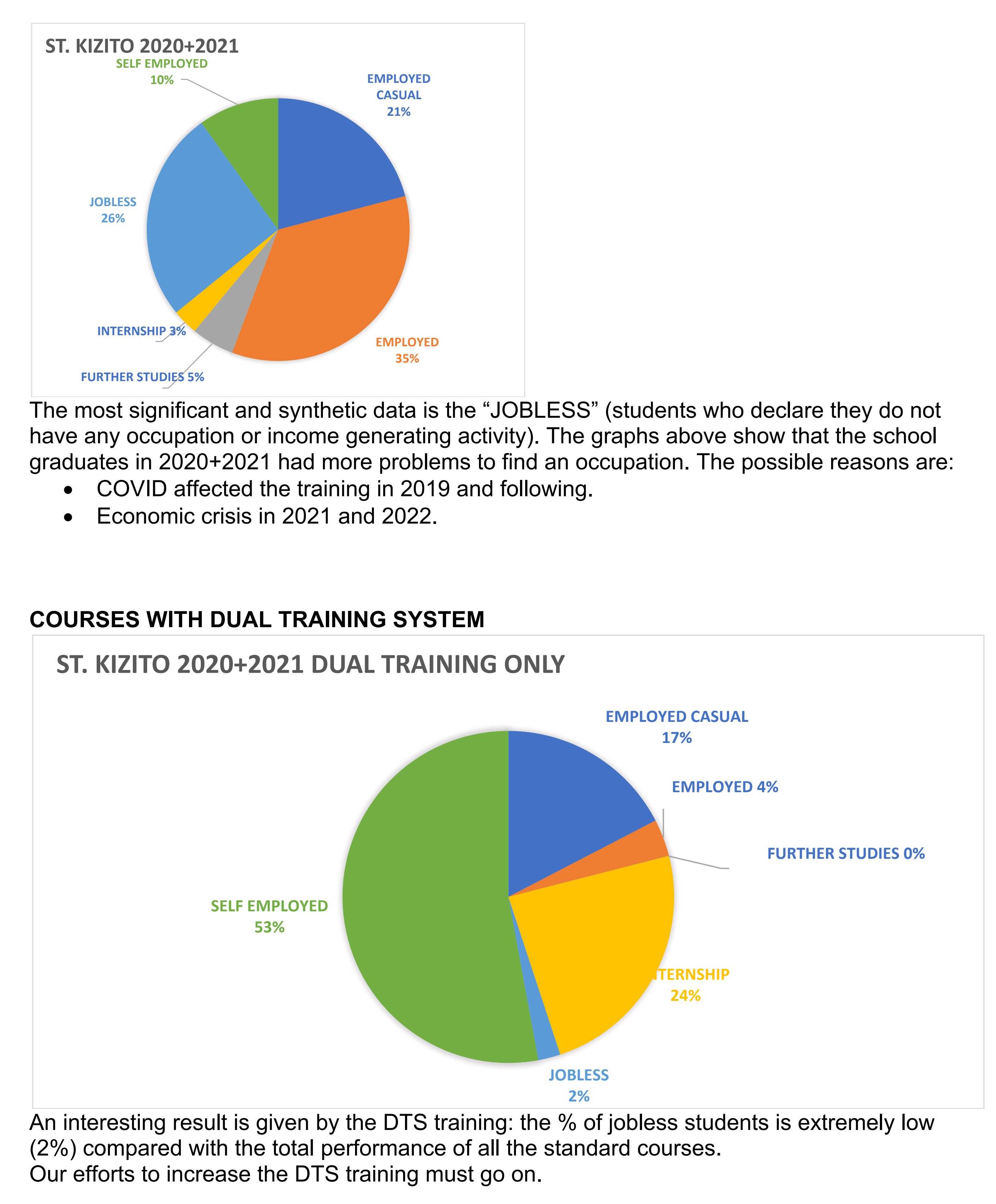
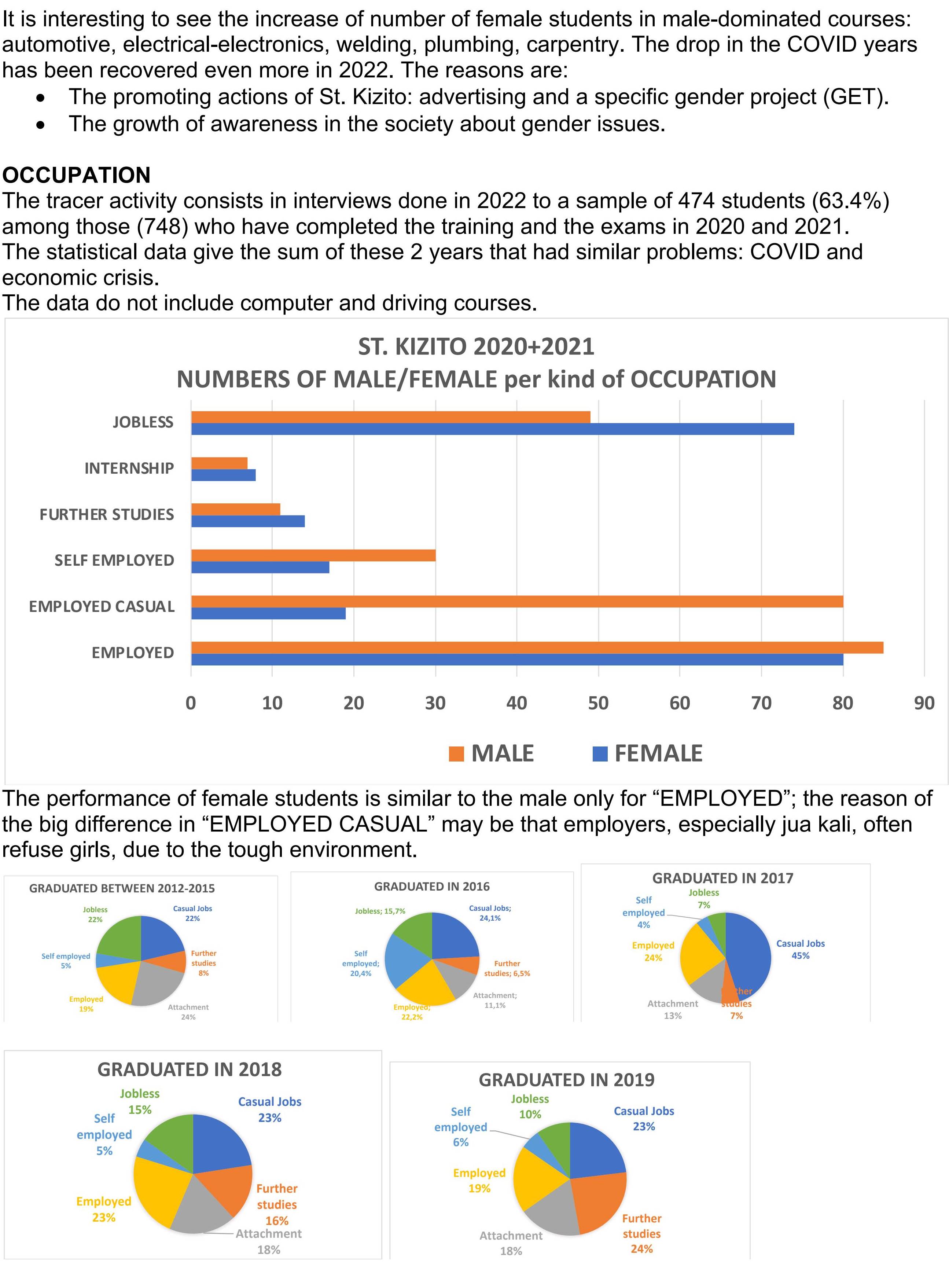
We hope that going forward into the year 2023 the female to male students' ratio will be constant or improve because we have also witnessed increased number of female students requesting to join male dominated courses compared to the past.



